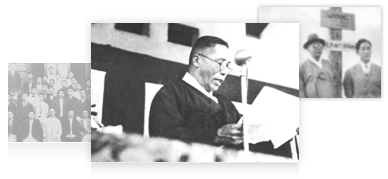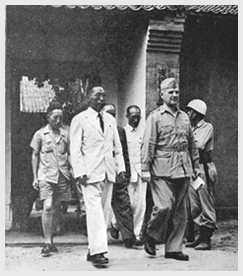


The Nation That I Desire
I want our nation to become the most beautiful nation in the world.. I do not want our nation to become the richest and powerful nation in the world. Because I have felt the pain of being invaded by another nation. I do not want my nation to invade others. It is sufficient that our wealth is such that it makes our lives abundant and our military strength such that it is able to repel others' invasion. The only thing that I desire in infinite quantity is the power of a highly-developed culture. This is because the power of culture both makes ourselves happy and gives happiness to others.
 What is lacking in humanity of today is neither military force nor economic power. Although the power of natural sciences is infinitely to be desired. the level of scientific progress achieved so far today is already sufficient to enable the entire human race to live comfortably. The root reason for humanity's unhappiness today is that people lack humanity, justice, compassion and love. If the mind of humanity is developed in this positive direction, mankind's present material capacity will be enough to enable all two billion of the world's population to live in comfort. The only thing that can improve the mind of humankind is culture and civilization.
What is lacking in humanity of today is neither military force nor economic power. Although the power of natural sciences is infinitely to be desired. the level of scientific progress achieved so far today is already sufficient to enable the entire human race to live comfortably. The root reason for humanity's unhappiness today is that people lack humanity, justice, compassion and love. If the mind of humanity is developed in this positive direction, mankind's present material capacity will be enough to enable all two billion of the world's population to live in comfort. The only thing that can improve the mind of humankind is culture and civilization.
I do not desire that our nation become a nation that imitates others. Rather, I desire that it become a nation that becomes the origin, the goal, and the model of this highly-developed and novel culture. I desire that a true world peace is fulfilled in, and because of, our nation. I believe that this is the very humanitarian ideal of Dan-gun,108 our national founding father.
Our people's talents, spirit and past discipline are sufficient to fulfill this mission, and so are our land's location and geographical conditions. Moreover, after experiencing the ravages of the First and Second World Wars, humanity demands from us such a mission. In addition, the historical timing of all this at a time when we are engaged in rebuilding our nation is more than appropriate for fulfilling this mission. Indeed, the days when our people will appear on the world stage as the main actors are just ahead of us.
What we need to do in order to fulfill this are the construction of a political system that guarantees freedom of thought and the perfection of people's education. This is the reason why I earlier emphasized a free nation and the importance of education.
If our people are to fulfill the mission of building the highest culture, everyone of us should, in short, become a sage. Every Korean, wherever he or she may go, should enjoy the trust and welcome of others. When our enemy was stepping down on our throats, we cultivated a fierce fighting spirit based on hatred and resentment of the enemy. But, the enemy is now gone, and it is time that we gave up the hateful struggle and dedicate ourselves to the building of unity. A house divided perishes, and a nation plagued by infighting also perishes. Hatred and fights among compatriots are signs of ruin. Our faces should radiate peacefulness. Our land should always be graced with gentle spring winds. These can be achieved by each one of our people reforming his or her own mind, and these can be permanently maintained by teaching this same spirit to future generations.
No one among our people Who strive to become the model for the highest cultures of mankind should be a selfish individual. Although we put extreme emphasis on the freedom of the individual, this freedom should not be the freedom used to fill one's own belly, as brute beasts do, but the freedom used to enable one's own people to live well. It should not be the freedom to pluck a flower from the park but the freedom to plant a flower in the park.
We should not be people who try to seize the possessions of others or people who try to receive the help of others. Instead, we should be people who make it their joy of life to give to their families, neighbors and fellow countrymen. This is what we call in our parlance sun-bi or gentlemen.
Therefore, we are not lazy but diligent. A head of a family who has beloved wife and children cannot but be diligent. This is so that he can give infinitely. He is the first to volunteer to take on difficult work because he loves his fellow countrymen. He is also the first to offer good and enjoyable things to others because he desires the welfare of those whom he loves. This is nothing less than In-hu-ji- duk109, which our forefathers loved.
As a result of this, our nation's mountains will be lush with forests, our fields will be abundant in all kinds of grains and fruits, and our villages and cities will be clean, rich and peaceful. So, the face of every Korean, both male and female, will always shine with peacefulness, and their bodies will radiate the fragrance of virtue. A nation such as this cannot be unfortunate even if it wanted to be unfortunate and cannot perish even if it wanted to perish.
A nation's happiness certainly does not come from class struggles, and an individual's happiness does not come from selfishness. Class struggles give birth to endless class struggles which stain the land with blood. If I hurt others out of selfishness, the entire world will hurt me out of selfishness. This, indeed, is getting little only to lose far more. The retaliation that Japan suffered in the War is the best example proving the validity of this principals on national and international levels.
What I have so far done is to paint a picture of the new nation that I desire. My fellow countrymen! How good would it be if our nation became this kind of new nation! How satisfied and happy would we be if we left our progeny to live in this kind of country! In the former times, Gi-za from the land of China admired our nation and came here to visit. Confucius also said that he wanted to come to our country and praised our people as a people that loved virtue. As this was indeed the case in the past, shall we nor strive so that peoples of the world in the future will come to adore our people's culture in the same fashion?
I am convinced that this will be accomplished by our strength and, particularly, by the power of education. How can this not be accomplished when all our young men and women have this mind and work in this direction?
Earlier, I devoted myself to education in Hwang-he Province. What I wished from education then was precisely this. Now that I am over 70 years old, I do not have enough days left which I personally can devote to education. I can only pray, therefore, that all educators and students under the heaven will realize the importance of this and reform their minds accordingly.










